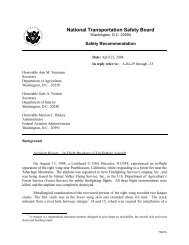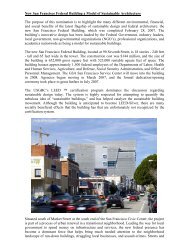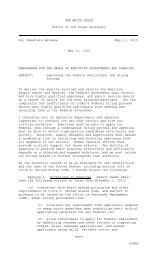Accenture's fifth annual global e-government study
Accenture's fifth annual global e-government study
Accenture's fifth annual global e-government study
You also want an ePaper? Increase the reach of your titles
YUMPU automatically turns print PDFs into web optimized ePapers that Google loves.
The United Kingdom<br />
2004 Rank: 9 (joint)<br />
2003 Rank: 8<br />
2002 Rank: 6<br />
Vision introduced: 2002<br />
Vision title:<br />
Information Age<br />
Government<br />
Vision summary:<br />
The <strong>government</strong>’s vision is of modernized, efficient<br />
<strong>government</strong>, alive to the latest developments in<br />
e-business, and meeting the needs of citizens and<br />
businesses.<br />
Regular Internet users (percent of population):<br />
53.20 percent<br />
Regular Internet users who have ever visited an<br />
eGovernment site: 61 percent<br />
The United Kingdom<br />
The United Kingdom made limited progress in its<br />
eGovernment program last year, which caused it to<br />
slip one place in the rankings to a joint ninth-place<br />
position with the Netherlands. The United Kingdom<br />
is among the large group of countries with maturity<br />
between 50 percent and 60 percent; consequently,<br />
its slower eGovernment progress allowed it to be<br />
overtaken by one of its close-ranking neighbors,<br />
France.<br />
While overall the services we surveyed for this report<br />
changed little, the UK <strong>government</strong> offered some<br />
notable improvements to its online program in 2003.<br />
The Government Gateway (www.gateway.gov.uk)—<br />
the centralized registration service for eGovernment<br />
services—underwent a major upgrade in April 2003<br />
to allow end-to-end transactions between agencies<br />
as well as with their customers. Also in 2003, the<br />
first service using the Government Gateway’s new<br />
payment engine functionality went live.<br />
For now, the United Kingdom’s eGovernment vision<br />
and strategy remain unchanged. Changes may be on<br />
the horizon, however. Andrew Pinder, the UK <strong>government</strong><br />
e-Envoy, will retire from his post in April 2004.<br />
At that time, his responsibilities for eGovernment<br />
will transfer to a new appointee in a newly created<br />
role, the Head of eGovernment. This will be a<br />
Cabinet-level position, described as “analogous to<br />
that of a CIO in a very large and diverse conglomerate”<br />
and “one of the most influential roles in the<br />
world of IT today.”<br />
According to the UK Online Annual Report 2003,<br />
www.e-envoy.gov.uk/assetRoot/04/00/60/69/<br />
04006069.pdf, “the challenge for <strong>government</strong> will<br />
be to capitalize on the potential of ICT (information<br />
and communications technology) to transform service<br />
delivery and achieve a step change in operational<br />
efficiency...The <strong>government</strong> has decided to appoint a<br />
Head of eGovernment, whose role will be to give<br />
strategic leadership and drive to the application of<br />
ICT within <strong>government</strong> to support the reform and<br />
modernization of Britain’s public services.” This official<br />
will be responsible for delivering existing targets<br />
for electronic service delivery by 2005, and will likely<br />
work closely with the Office of Government<br />
Commerce to that end.<br />
102













